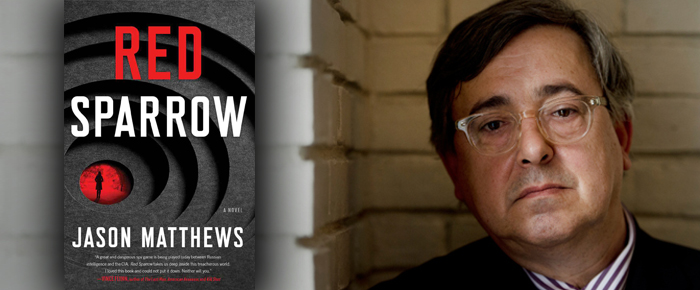
By Heidi Simmons
—–
Red Sparrow
by Jason Matthews
Fiction
—–
Last week, the Rancho Mirage Public Library Foundation hosted its 17th Annual Literary Luncheon. Held at the Omni Rancho Las Palmas Resort & Spa, 330 people attended to enjoy lunch with a secret agent novelist.
Speaker Jason Matthews had a career in the Central Intelligence Agency that spanned over 33 years. He was a former officer in the Operations Directorate, which is now known as the National Clandestine Service. Matthews may be retired, but he isn’t done with espionage. Red Sparrow (Scribner, 448 pages) is Matthews’ first novel and it resembles his past career and the organizations he worked for and against.
The story is about Russian intelligence officer Dominika Egorova, who struggles to survive in the post-Soviet world. Against her will, she becomes a “Sparrow” – a trained seductress in the art of “sexpionage.” When she is assigned a young CIA officer, Nathaniel Nash, their worlds collide and a dangerous game of counter intelligence ensues.
Matthews made a few references and remarks about his book, but mainly spoke about the fascinating world and life inside the CIA. Both he and his wife held tandem positions in the secretive organization. The couple raised two daughters abroad.
“People are very curious about what it is we do,” he said. “The short answer is we steal secrets. We steal secrets from governments to enable our leaders to make informed national security policy decisions.” Matthews said intelligence work was similar to “clandestine journalism.” Like a reporter seeking a story, the intelligence officer recruits a source, gathers information but instead of publishing a story, files a report with Washington. Just as a journalist protects a source, so must the case officer.
“It’s different than Hollywood movies,” Matthews said. He defined the difference between agent and officer. An agent is a recruited foreigner who has accesses to secrets and will surreptitiously meet and share the secrets with officers like Matthews and his wife. “Recruitment by any intelligence service is an irrational act. It’s counter intuitive,” said Matthews. “An intelligence officer asks a prospective agent to break the laws of his or her country, to commit treason and in some cases take tremendous risk.”
Regarding a “Sparrow” school equivalent in the United States, Matthews said the US does not use sexpionage because an agent working under duress or coercion is unreliable and prone to disinformation.
Matthews spoke about how the CIA has developed an acronym for assessing human motivation and vulnerabilities when recruiting agents: MICE — money, ideology, conscience and ego. He said the risk can be a blood sport and the survival rate of Russian and Eastern European agents was in his time 18 months. Matthews said the job was arcane and eclectic, experiential and intense.
After retirement, Matthews had to find something interesting to do, so he wrote Red Sparrow. He admits it was partly as therapy. The book is fiction, but is a mosaic formed by his experiences. Matthews wanted to write a story like authors John LeCarre, Charles McCarry, Ian Fleming or Charles Cumming who were actually involved with intelligence work. He wanted to get away from the default plot of a former officer being chased by colleagues, and tell a story that would to be evocative of the old Cold War.
Matthews signed a secrecy agreement with the CIA, which required that Red Sparrow be read by the CIA Publication Review Board to ensure no critical information was revealed.
Taking questions, Matthews was asked mostly about contempory issues and current events. Regarding Edward Snowden, he said he believes Snowden may have been recruited by the Russians and only five percent of the information he stole was about domestic surveillance!
Matthews felt that Snowden’s information may have been partly responsible for the NSA’s inability to anticipate Putin’s move into Crimea. “I think Snowden’s a traitor,” said Matthews. “He’s in a lot of trouble and when the Russians are done with him, they will crumple him up and toss him away.”
Questions were asked about Aldridge Ames, Francis Gary Powers, Jonathan Pollard and Valerie Plame. Matthews was clueless about the disappearance of Malaysian flight 370 and didn’t intimate it was something clandestine.
Regarding Putin, Matthews said he was a modern day Stalin and despot. “What he did in Crimea is incomprehensible. He’s a nationalist,” said Matthews. “Maintaining his personal power and restoring the grandeur of Russia is a priority. He doesn’t want a resurgence of the old Russia, but wants to destroy NATO and weaken the Euro Atlantic alliance.” Matthews was asked about a sequel to Red Sparrow and if Putin would continue to play a big part in the story. He said he was considering an affair between Putin and his protagonist Dominika.
Now living here in the Coachella Valley, Matthews was happy to talk about his work and the notorious world of spycraft. In writing fiction, he has found a voice that still keeps him busy in the world of espionage.
“We were interested in Jason Matthews because of his topic and the fact that Russia is in the news,” said Susan Cook, Principle Librarian and Author Luncheon Committee member. “People are always fascinated with current events and we wanted something that would appeal to everybody.”
Rancho Mirage Public Library Foundation sponsored of the event. The foundation is the fundraising arm for the library and is the largest ongoing non-public supporter of the library.
Library Director David Bryant spoke before introducing Matthews. “We are in the golden age of the Rancho Mirage Public Library,” said Bryant. “I really believe that. I think we have positioned ourselves in a marvelous community of very intelligent people and what we have to offer is truly extraordinary. What we offer is nurturing the human mind and how many place can say that.”
Matthews certainly provided provocative insight into the dangerous ever-shifting world we share.








































